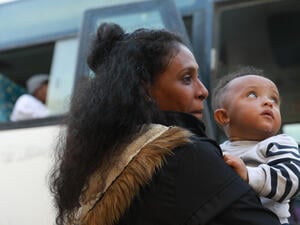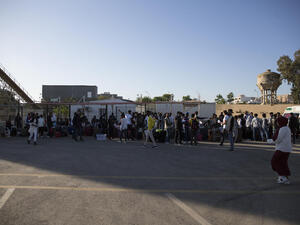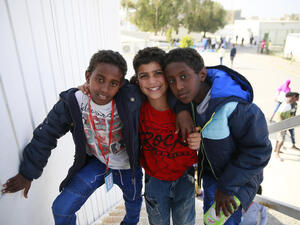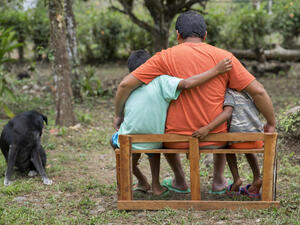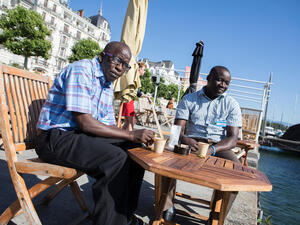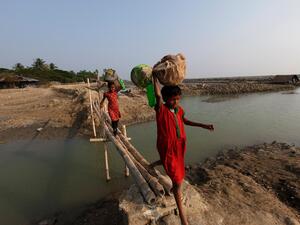Q&A: Pulitzer-winning professor charts slain UN envoy's life
Q&A: Pulitzer-winning professor charts slain UN envoy's life
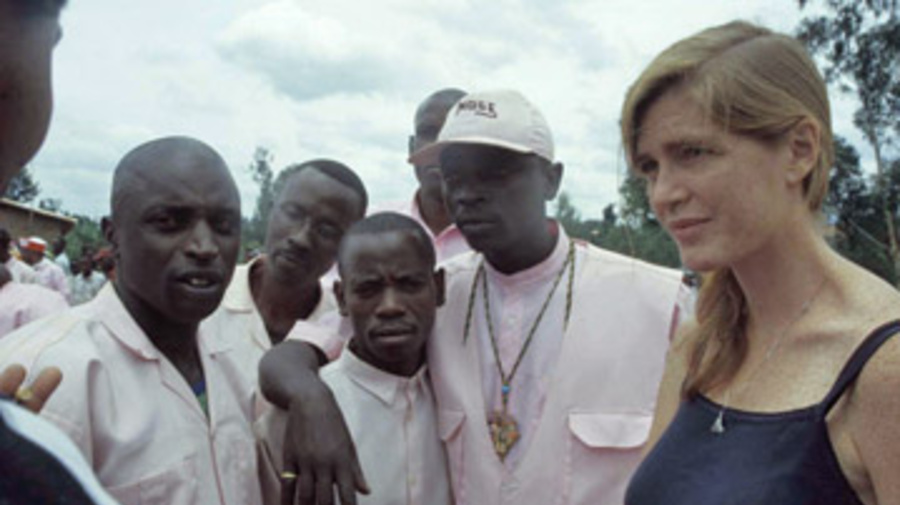
Samantha Power on assignment in Rwanda.
WINTHROP, United States, April 18 (UNHCR) - Samantha Power has achieved much in her 37 years. A Pulitzer Prize winner, Harvard University professor and respected journalist, Power has also been a senior foreign policy adviser to US presidential hopeful, Barack Obama. Earlier this year she released her second book, "Chasing the Flames: Sergio Vieira de Mello and the Fight to Save the World," a biography of the top UN envoy killed during a suicide attack in Baghdad in 2003. Power charts Vieira de Mello's life from his upbringing as the son of a Brazilian diplomat through his many years with UNHCR in hotspots around the world to his role in trying to resolve some of the key global crises, including Bosnia, Kosovo, East Timor and Iraq. She spoke by phone to UNHCR Web Editor Leo Dobbs. Excerpts from the interview:
Why did you write this book?
There is a lot of talk these days about 21st Century challenges and threats across borders and so forth, but so many of our models - the people we look to for guidance - are still very 20th Century, they're very statist. There are very few studies of people who move across borders, like the challenges they are trying to confront. My first instinct was, wow, here is a person who operated at an international level, transnational level and a sub-state level for his entire career. He also spent so much of his career in the field and thus had a 34-year head start dealing with violent places and violent people.
Among the major challenges on the horizon today, I think, are failing states, repressive states, genocidal atrocity states and so on. Sergio had such a head start thinking about ways of responding to those issues; it seemed a shame not to try to retrieve all that learning of his from the wreckage of the past.
What kind of research did you undertake?
UNHCR was amazing and gave me access to its files in Geneva. They were very, very generous in letting me peer into how he prepared for meetings and his trip reports and memos and so forth. And the correspondence from others to him. I was also granted unlimited access to the archives of the UN Department of Peace-Keeping Operations in New York. The book is also based on e-mails and letters to and from Sergio's colleagues, but most foundationally on 400 interviews with his colleagues and friends and others who worked with him in specific areas.
The interviews are almost like an oral history of his role in those missions, but also of the missions themselves.... What I was trying to capture was his life and how he made decisions at difficult junctures with very imperfect information. The paperwork on internal deliberations was really helpful in confirming or amending the memories that people had.
A lot of it was going from the paper trail to the interviews to a separate set of interviews, back to the paper trail - it was like a circle ... the real challenge was to fact check everything as rigorously as I could.
What about your own memories of Sergio?
When I first met him in Bosnia [in 1994], he was known as a cross between James Bond and Bobby Kennedy. He was again taking leave from UNHCR and was part of the peace-keeping mission. Johnathan Moore, a US diplomat and friend of mine, told Sergio that a rookie reporter had just arrived in the Balkans and needed guidance. Sergio called up and we made a plan to meet for dinner. In the meantime, a UN safe area called Gorazde came under savage attack so I didn't expect Sergio to keep our appointment. But he did and with his vaunted cool under fire said: "If World War III breaks out while we are at dinner, I won't order a second bottle of wine." He made it clear that he lived on the edge and managed the most pressing issues of the day, but he also deliberately projected an aura of calm that was very soothing for many.
The UN mission in Bosnia was not a great one for him. He was the number two civilian and he was frustrated because UN officials in the field were not getting sufficient diplomatic or political support from capitals. So, he found himself in a situation that he later called, quoting [French intellectual] Bernard-Henri Lévy, "passing sandwiches out of the gates of Auschwitz." At the time, he defended the mission; as a UN guy he hated the criticisms the peace-keepers were being subjected to.... We had long and heated discussions about whether the UN mission should be shut down, what could be done differently and whether military force should be used.
We overlapped for about a year and then he left. We lost touch and then the Kosovo crisis happened and I returned to the Balkans as a reporter and found him running the entire place. I felt like he was in a different role, the role he belonged in. He got to make the decisions. He was still frustrated of course by governments but had grown very, very skilful as the number one guy who was deft at extracting from governments the resources that he needed to do the job. He was only there for five or six weeks and, while we stayed in touch, that was the last time I saw him in person.
Where do you think Sergio would have ended up if he had lived?
Sergio always had an unrivalled ability to earn the respect and the support of all the governments on the Security Council ... that makes you a pretty unusual UN civil servant. With that kind of backing, he could have been put forward as a candidate to become the UN Secretary-General. It was Asia's turn in 2006, so it was unlikely he would have been named Secretary-General on this round - unless East Timor claimed him as one of their own! But he was so young and so able that I think eventually the member states would have turned to him and named him Secretary-General.
Which refugee situations have had the most affect on you?
My introduction to this whole business came in 1992. I graduated from university in the States and went to teach English in Berlin in June 1992, a time when refugees were pouring into Germany from the former Yugoslavia. All I felt was great impotence, but the images of these people lodged in my mind.
When I moved to the Balkans and became a reporter, I was initially based in Croatia which was home to more than a million Bosnian and Croatian refugees. The scenes - biblical fields of people in tents or warehouses - moved a lot of the work that I did in that period. More recently, I have been most moved by the reporting I have done in Darfur and Chad - haunting places.
What do you think US policy should be towards the United Nations and towards the refugee issue?
I would say that on the UN generally, the US's ability to promote peace and security and the US's ability to restore its standing in the world is going to turn in least in part on its relationships with other countries - its ability to develop collective security arrangements, common humanitarian commitments and so forth and to enhance cooperation. The US relationship with the UN will improve when the US's relationship with the countries that comprise the UN improve.
When it comes to the specialized agencies and the humanitarian functions of the UN, I think the US is torn. With UNHCR, the United States continues to be a very strong supporter on the aid side, but it has become less supportive in granting asylum as the slots for refugees have been caught up with Homeland Security questions. Washington simply has to grant more expeditious review of asylum cases. It is a balancing act for sure, but the next president is going to have to embrace the balance and not simply close America's doors.
Do you think your book could have an affect on US thinking?
Part of what this book can do in the United States is open up the UN system finally and show it - warts and all - while also showing the tremendous good that the organization does day-to-day. There's just so much ideology in the US around the UN. Folks on the right caricature the UN as black helicopters and world government and so forth, while progressives sometimes treat it as though it has a mind, a body, a bank account of its own. Most Americans do not have a very sophisticated understanding of the workings of the UN.
I think there's a real opportunity to mend the UN's reputation in the United States - not by spinning it, but just by opening it up and by giving UN operations more transparency and highlighting not only Sergio's life, but the lives of his colleagues and the kind of risk-taking that people do for the sake of civilian protection, global stability or refugee care. It's incredibly impressive and will surprise a lot of people.
Is there interest in making a feature film based on the book?
There appears to be.... [Northern Irish director] Terry George, who did "Hotel Rwanda," has long been interested in Sergio. He sees Sergio as a very important window into our times. But I don't know the status of that right now.
Do you see any similarities between Sergio and Barack Obama?
I do. I think they both have these incredible leadership qualities, starting of course with charisma. In Sergio's case, young people in UNHCR wanted to be by his side in a mission so they could learn from him. In Barack's case, more dramatically, millions of people have been politically activated for the first time in their lives, giving money and coming out to canvass. In terms of foreign policy and problem-solving, I also think they're very similar. Both ask a lot of questions as a way of divining what the right policy is, both are very non-hierarchical and non-ideological.
Both are empirical in that they want to know what works and are less interested in the way things have always been done. They understand the rules of the game and understand they have to play within them, but they have a set of ideals that they are in public service to promote. They can be hugely pragmatic in terms of getting those ideals realized. You see that with Sergio in the way that he negotiated with the Serbs and the Khmer Rouge. In Obama's case, he's gone against the grain in Washington by saying we should negotiate; that as president he would be prepared to meet with [Iran's President Mahmoud] Ahmadinejad and with Syria.
They both have this ability actually to see individuals around them. Sergio had an ability to disaggregate the "human" in humanitarian or the "human" in human rights. He actually saw the refugees as individuals - they were not abstracts. Obama is the same. I see it in the way he treats his staff and the way he relates to ordinary people - he brings an intense focus and he gives people at all levels of society the same kind of respect he would give people at a very high level - I think this quality is really rare.


